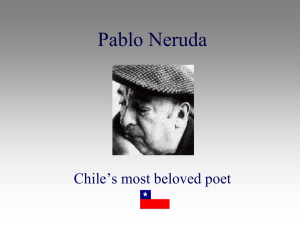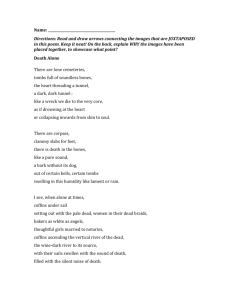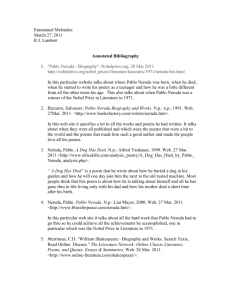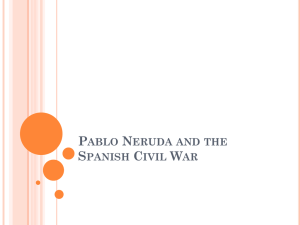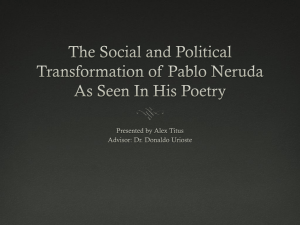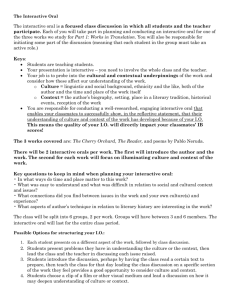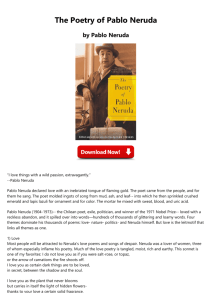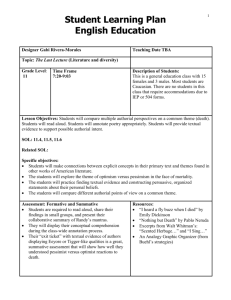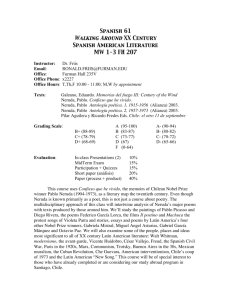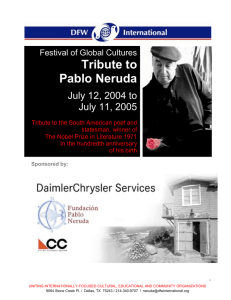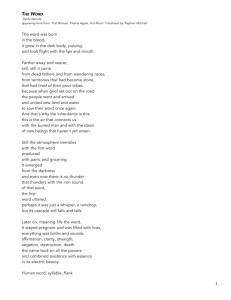Spanish 460 Walking Around XX Century Spanish American
advertisement
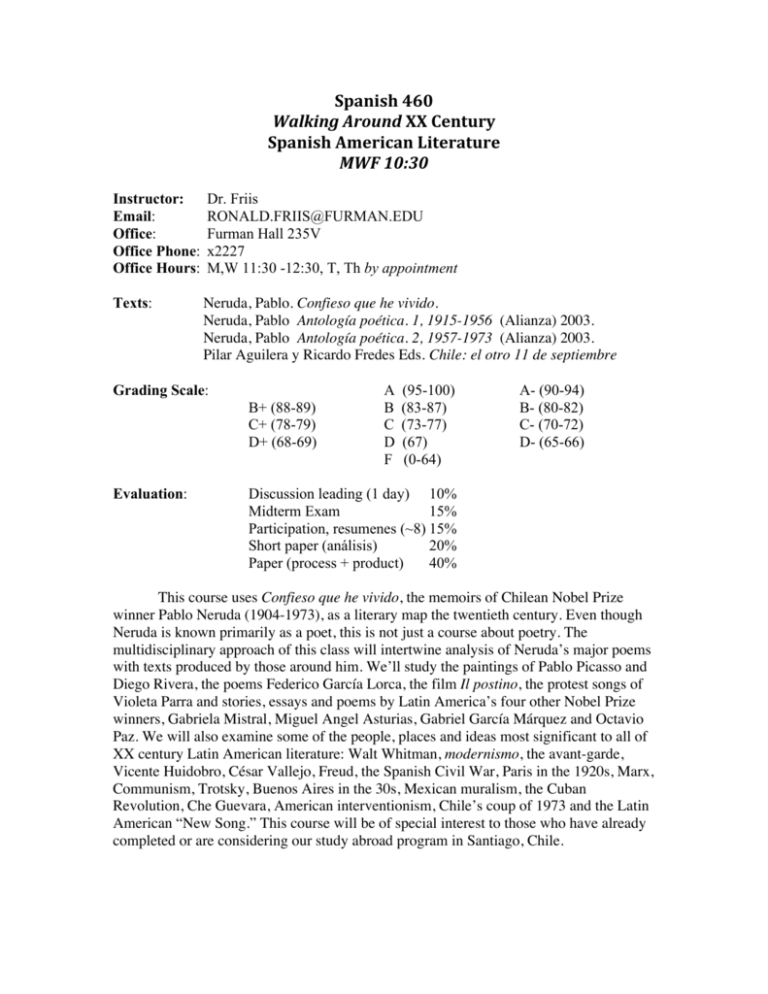
Spanish 460 Walking Around XX Century Spanish American Literature MWF 10:30 Instructor: Email: Office: Office Phone: Office Hours: Dr. Friis RONALD.FRIIS@FURMAN.EDU Furman Hall 235V x2227 M,W 11:30 -12:30, T, Th by appointment Texts: Neruda, Pablo. Confieso que he vivido. Neruda, Pablo Antología poética. 1, 1915-1956 (Alianza) 2003. Neruda, Pablo Antología poética. 2, 1957-1973 (Alianza) 2003. Pilar Aguilera y Ricardo Fredes Eds. Chile: el otro 11 de septiembre Grading Scale: B+ (88-89) C+ (78-79) D+ (68-69) Evaluation: A B C D F (95-100) (83-87) (73-77) (67) (0-64) A- (90-94) B- (80-82) C- (70-72) D- (65-66) Discussion leading (1 day) 10% Midterm Exam 15% Participation, resumenes (~8) 15% Short paper (análisis) 20% Paper (process + product) 40% This course uses Confieso que he vivido, the memoirs of Chilean Nobel Prize winner Pablo Neruda (1904-1973), as a literary map the twentieth century. Even though Neruda is known primarily as a poet, this is not just a course about poetry. The multidisciplinary approach of this class will intertwine analysis of Neruda’s major poems with texts produced by those around him. We’ll study the paintings of Pablo Picasso and Diego Rivera, the poems Federico García Lorca, the film Il postino, the protest songs of Violeta Parra and stories, essays and poems by Latin America’s four other Nobel Prize winners, Gabriela Mistral, Miguel Angel Asturias, Gabriel García Márquez and Octavio Paz. We will also examine some of the people, places and ideas most significant to all of XX century Latin American literature: Walt Whitman, modernismo, the avant-garde, Vicente Huidobro, César Vallejo, Freud, the Spanish Civil War, Paris in the 1920s, Marx, Communism, Trotsky, Buenos Aires in the 30s, Mexican muralism, the Cuban Revolution, Che Guevara, American interventionism, Chile’s coup of 1973 and the Latin American “New Song.” This course will be of special interest to those who have already completed or are considering our study abroad program in Santiago, Chile. Course Objectives: To help students develop an understanding of and appreciation for some of the main intellectual currents of XX century Spanish American literature. To introduce students to some fundamental concepts of literary criticism and to allow them to refine their skills in the analysis of texts. To acquaint students with basic research techniques when appropriate and possible. To develop further the five basic language skills in Spanish with an emphasis on reading and speaking. Graded assignments in this course will include a midterm test, reading quizzes (for content), 8-10 resumenes, a formal analysis of a Neruda poem (not discussed in class) and a final paper. Your participation grade will reflect your linguistic and analytical progress. Resumenes These one page (~300 word) summaries and reflections on readings are to be turned in, by email, as an MS Word attachment entitled yourname_resumen_week#.doc (smith_resumen_5.doc). You will turn in 8-10 of these, one per week, as assigned. During a given week you can choose which day to write on (Monday, Wednesday or Friday's HW) but you must turn in this essay before class to get credit. Other Required Readings Although we will not always have a chance to discuss all of these in detail in class, required readings will be assigned and information from them will appear on the tests. These essays have been selected because they will help you understand ideas and movements that run through the texts we will analyze in class. Discussion leading You will lead one or two discussions this semester. Different assignments will require different modes of presentation. Some will be 15-20 minutes, others will last longer. Typically, your time will be devoted to inciting large and small group conversation, asking and answering different types of questions and summarizing content in a concise fashion. You are not expected to have all the answers to open-ended questions! These presentations are not to be read though you may consult notes as you go. They are not lectures. Think about making connections across readings and disciplines as you prepare. You will want to come to class armed with great questions. Final Paper Your final paper in this class will be an analysis of a theme or themes in one or a few literary texts. The paper does not need to be on poetry or solely on Neruda (though both are fine) but should use our class discussions as a touchstone or point of entry. The most important part of this paper will be your ability to analyze and interpret literary texts that support your argument. There is also a small research element to this paper that involves searching for and identifying information related to your thesis and lining up published opinions and evidence that support and/or refute your position. We will spend a lot of time both in class and out on all aspects of this project. Writing is a process and you will be graded on how well you participate in the process of writing. Our process will include an outline, a brief bibliography, an abstract, a peer review, and more. Notes: 1) Daily preparation must be thorough. You must come to class PREPARED AND WILLING TO SHOW IT through ACTIVE participation. Preparing for class means spending an appropriate amount of time reading the day’s assignment and doing any written work. After this preparation, you will be ready to discuss the readings in class with the professor and your peers. Expect a participation grade of B- to C if you are prepared but passive. You are learning to formulate, express and debate your opinions and interpretations of art, literature, music and ideas in this class. 2) Have access to a good English/Spanish dictionary. I like Harper Collins and Oxford. You can also try wordreference.com. Don't embarrass yourself with other internet translators. 3) “Late is rude...” -President George W. Bush “On time means two minutes early...” -Coach Joe Paterno 4) It is your responsibility to notify your instructor as soon as possible, preferably beforehand, if you have an excused absence. Work missed due to excused absences will be accepted within two days of the absence. Work missed due to unexcused absences cannot be made up. 5) The Instructor reserves the right to change this syllabus. 6) Students with disabilities who need academic accommodation should contact Disability Services (x2322). After this meeting, the student should meet with me. This process needs to happen early in the term. The Office of Academic Assistance, a helpful resource for many freshmen, is located on the ground floor of the library (x2110). Attendance: All students are expected to attend every class session. A student who has more than three unexcused absences during the term will be dropped from the class roster and assigned a grade of “F.” Below is a tentative schedule of topics and readings. Required and suggested readings will be assigned daily in class. fecha 24-Aug 26-Aug tema Introducción Contexto histórico / los últimos modernistas tareas 29-Aug 31-Aug 2-Sep Gabriela Mistral Gabriela Mistral Juventud, Crepusculario (1923) resumen de lectura 1 Fiesta del Día del Trabajo - no hay clase XX poemas de amor (1924) París, los años 20, César Vallejo resumen de lectura 2 12-Sep 14-Sep 16-Sep Vicente Huidobro, la vanguardia, Pablo Picasso La generación de '27 española - Federico García Lorca La guerra civil española - España en el corazón (1938) resumen de lectura 3 19-Sep resumen de lectura 4 21-Sep 23-Sep Miguel Hernández Residencia en la tierra I y II (1933, 1935), Tercera residencia (1947) Stalingrado 26-Sep 28-Sep 30-Sep Diego Rivera, los muralistas mexicanos y Frida Kahlo Miguel Angel Asturias Macchu Picchu (1947) les doy el tema del análisis Macchu Picchu (1947) Canto general (1950) Canto general (1950) entregar análisis 5-Sep 7-Sep 9-Sep 3-Oct 5-Oct 7-Oct 10-Oct 12-Oct 14-Oct Repaso Examen midterm Descanso de otoño - no hay clase resumen de lectura 5 17-Oct 19-Oct 21-Oct Las uvas y el viento (1954) Los versos del capitán (1954) Jorge Luis Borges 24-Oct 26-Oct 28-Oct Nicanor Parra Il postino (película) I Il postino (película) II 31-Oct 2-Nov 4-Nov Odas elementales (1954), Nuevas odas elementales (1956) Estravagario (1958) Cien sonetos de amor (1960) 7-Nov 9-Nov 11-Nov Julio Cortázar - "El perseguidor" (1959) Violeta Parra, Víctor Jarra y la Nueva Canción Chile - el otro 11 de septiembre resumen de lectura 7 14-Nov 16-Nov 18-Nov Chile - el otro 11 de septiembre Chile - el otro 11 de septiembre Ensayo entregar resumen del ensayo 21-Nov 23-Nov 25-Nov Ensayo Acción de gracias Acción de gracias 28-Nov 30-Nov 2-Dec La soledad americana Gonzalo Rojas Ariel Dorfman "Saying Goodbye to Pablo" 5-Dec Último día de clase entregar tema del trabajo final resumen de lectura 6 entregar bibliografía entregar bosquejo del ensayo final evaluación por sus pares entregar ensayo final These are some of the most important books on Neruda - most are from the library, some are mine... Since many of you will be writing papers with overlapping topics I will keep all of these materials, and more, in my office and can lend them to you. Please ask me for anything you may need and share books you have with your classmates. Agosin, Marjorie. Pablo Neruda. Alazraki, Jaime. Poética y poesía de Pablo Neruda. Alonso, Amado. Poesía y estilo de Pablo Neruda. Costa, René de. The Poetry of Pablo Neruda. Durán, Manuel. Earth Tones : The Poetry of Pablo Neruda. Firmat, Gustavo Pérez. Ed. Do the Americas have a Common Literature? González Echevarría, Roberto and Enrique Pupo-Walker, Eds. The Cambridge History of Latin American Literature. Méndez-Ramírez, Hugo. Neruda's Ekphrastic Experience : Mural Art and Canto general. Neruda, Pablo. Obras completas I y II. Santí, Enrico Mario. The Poetics of Prophecy.
